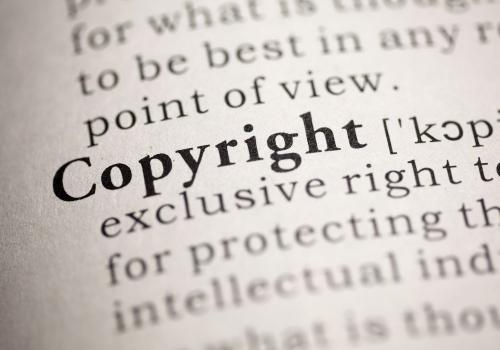A Guide for Australian Business Owners on Copyright Infringement

In today's technology fuelled environment, where information flows freely and content is just a click away, protecting intellectual property has become more challenging than ever before.
Business owners in Australia face a multitude of copyright infringement risks that can jeopardise their creative works, reputation, and bottom line.
In this post, we will delve into the key challenges faced by business owners in navigating copyright infringement, explore relevant legislation, and provide actionable tips to safeguard your business.
Understanding copyright infringement in the digital world
In the digital world, copyright infringement has taken on new dimensions. It's like a game of "Whac-a-Mole," where infringing content pops up unexpectedly, challenging your ability to protect your work.Just like a gardener needs to constantly tend to their plants, business owners must actively monitor their digital presence to combat copyright infringement.
How does the Copyright Act 1968 protect you?
The Copyright Act 1968 is Australia's primary legislation governing copyright protection. Think of it as the foundation of your business's legal fortress.
This act grants exclusive rights to the creators of original works, including literary, artistic, musical, and dramatic works. It's crucial for business owners to understand this legislation to effectively combat copyright infringement and protect their intellectual property.
Tackling the copy-paste culture by educating employees
The modern digitalised workplace makes it easy for employees to unintentionally slip into the copy-paste culture. Imagine your business as a thriving ecosystem where each employee contributes unique elements to its growth.
A business benefits from the collective creativity of its employees. By fostering a culture of awareness, providing clear guidelines, and offering regular training sessions on copyright infringement, you can cultivate an environment that values originality and respects intellectual property.
The risks of image and content sharing without licenses and permissions
Sharing content and images online may seem harmless, but without proper permission or licensing, you risk facing legal consequences.
To avoid infringement, it's vital to obtain the necessary licenses or permissions before using copyrighted material. Think of it as asking for your neighbour's explicit consent before borrowing their lawnmower. By doing so, you not only respect their property but also protect yourself from potential legal issues.
Let's imagine you own a lively café in Melbourne and decide to enhance the ambiance by streaming popular music tracks. However, without obtaining the necessary licenses from copyright holders or utilising a licensed music streaming service, you inadvertently expose your business to infringement risks.
This scenario is akin to hosting a party without obtaining the necessary permits. By ensuring you have the proper licenses and permissions in place, you can create an inviting atmosphere while complying with copyright regulations.
The use of digital tools as your copyright protectors
Fortunately, technology also offers solutions to help you combat copyright infringement.
Copyright monitoring services, image recognition software, and plagiarism detection tools can assist in identifying unauthorised use of your content and proactively address potential infringements.
By harnessing the power of these tools, you can maintain control over your intellectual property and nip infringement in the bud.
Fair use and copyright infringement
When discussing copyright infringement, it's essential to understand the concept of fair use. Fair use allows limited use of copyrighted material without permission from the copyright holder for purposes such as criticism, comment, news reporting, teaching, scholarship, or research.
However, the boundaries of fair use can be murky and subjective. As a business owner, it's crucial to be aware of the factors that courts consider when determining fair use. These include the purpose and character of the use, the nature of the copyrighted work, the amount and substantiality of the portion used, and the effect of the use upon the potential market for the copyrighted work.
Understanding these factors can help you make informed decisions about using copyrighted material in your business activities.
Copyright infringement online and dealing with user-generated content
Today, user-generated content plays a significant role in marketing and brand engagement. However, it also opens the door to potential copyright infringement issues.
Consider your business's social media accounts, where followers might share images or videos without proper permissions or licenses. This is like someone spray-painting graffiti on the walls of your establishment. While you may not be directly responsible for the infringement, you have a responsibility to address it promptly.
To mitigate copyright infringement risks associated with user-generated content, it's essential to establish clear guidelines and policies for user submissions.
Implement a robust content moderation process to ensure that any shared content complies with copyright laws. Promptly remove any infringing content upon discovery and educate your followers about copyright awareness and the importance of obtaining proper permissions before sharing content.
In an interconnected world, it's crucial to consider international copyright protection, particularly if your business operates globally or caters to an international audience.
Think of it as extending the walls of your fortress beyond national borders to shield your intellectual property worldwide.
Australia is a signatory to several international copyright agreements, including the Berne Convention and the WIPO Copyright Treaty. These agreements provide reciprocal protection for copyrighted works across participating countries.
However, navigating international copyright laws can be complex. Consider consulting with legal experts or intellectual property professionals specialising in international copyright to ensure comprehensive protection of your creative works beyond Australian borders.
Key takeaways
Protecting intellectual property has become increasingly challenging for Australian business owners in the digital age.
There is a lot to understand, including copyright legislation, infringement risks, obtaining licenses and permissions, fair use, user-generated content responsibly, and more.
By implementing proactive measures, business owners can navigate copyright infringement challenges, safeguard their creative works, and foster a culture of respect for intellectual property.
As a business owner myself, I know that there is nothing more important than protecting your IP.
Advertise on APSense
This advertising space is available.
Post Your Ad Here
Post Your Ad Here

Comments